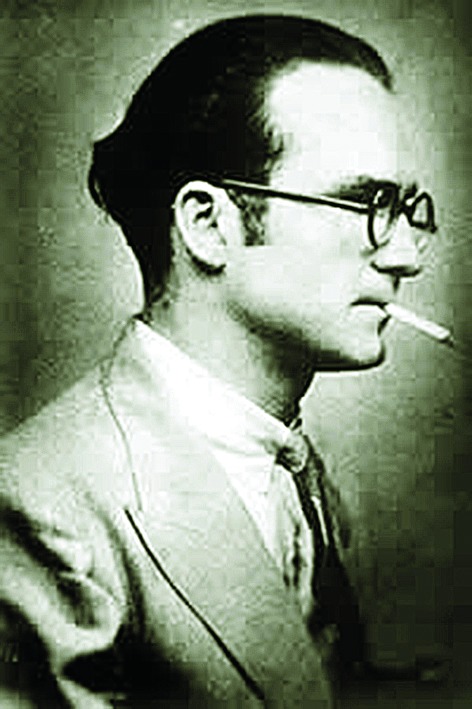



At the time she said it, it meant little or nothing to her hosts. Teodora Miriam Chipei was visiting Calcutta for the first time and staying with a Bengali family. Sometime during her stay she mentioned Maitreyi.
Maitreyi Devi - Bengali poet, litterateur, Tagore protégé. Daughter of Sanskrit scholar and philosopher Surendranath Dasgupta. Heroine of Romanian writer Mircea Eliade's "scandalous" and eponymous love story, Maitreyi . She came to know of Mircea's work in the 1970s, 40 years after its Romanian debut and wrote a novella repartee - the Bengali Na Hanyate and its English translation, It Does Not Die.
Her name tripped off Teodora's tongue with easy familiarity. She had read the book in Romanian in her home town in eastern Romania's Iasi, and she seemed animated at the possibility of finally beholding the house "where it all happened".
The 20-year-old Mircea had been Maitreyi's father's student and a houseguest at the Dasguptas' south Calcutta residence. Maitreyi was a sweet sixteen. There was a romance, followed by the inevitable discovery and denouement. Mircea was banished from the Dasgupta home. He eventually left the country. And Maitreyi, she got married to someone else. That, roughly, is the framework of both Mircea and Maitreyi's works. The difference lies in their separate tellings.
Ginu Kamani, who has written the paper "A Terrible Hurt: The Untold Story Behind the Publishing of Maitreyi Devi" accuses Mircea of rendering Maitreyi into "a caricature of a tantric goddess" and calls the work a "self-indulgent fantasy". Kamani is "overwhelmed" by Maitreyi's book though, "thoroughly discrediting his version of their relationship..."
Teodora was familiar with both versions. In any case, at the end of two weeks, she left for Germany, where she is currently studying to become a high school teacher and stories of her Calcutta experience passed into the realms of the host family lore. All stories except the Maitreyi story. That one, because of its unfamiliar familiar character, remained wedged between memory and telling, neither completely rejected, nor completely understood. Mostly because, here and now in Maitreyi's own land, neither the book nor its author has as much recall among current generations as it once did. And as we will find out, even that was nothing compared to the mass appeal both continue to hold for Romanians.
Recently, a good two years after Teodora's visit, what she said about Maitreyi came streaming back to consciousness as one stumbled upon posters of what could be a film or a play or an exhibition titled Maitreyi.
The credit line reads: MAIA MORGENSTERN - Maitreyi la 60 de ani, VLAD ZAMFIRESCU - Mircea Eliade, DORU ANA - Naren Sen, JASMINE ILIESCU - Chabu... The juxtaposition of the Romanian and Bengali names amused and surprised. Later, in an email from Paris, poet and essayist Fevronia Novac, who has a published paper on Maitreyi Devi's response to Mircea's novel, said it is a recent play directed by Chris Simion. She specified that playing the senior Maitreyi's role was Maya Morgenstern, "one of Romania's best actresses".
Chris, who is based in Bucharest, is too busy to be pinned down for an interview. But in biletmaster.ro, the Romanian counterpart of bookmyshow.com, one can find a quote attributed to her that helps us understand her Maitreyi fascination. It reads: "The first time I came to know the story was during adolescence, when it was included in the school curriculum as mandatory reading for the graduation exam. The second time coincided with my trip to India..." Teodora had also mentioned that she had read Mircea's book when in highschool. "It was popular among schoolmates, especially the girls," she had said.
Teodora and Chris occupy different age boxes, about 15 years apart. But should you look up online book reviews, you will find an even younger audience with last names like Mazilu, Anghel, Iticescu, Pinzariu, posting comment after comment about Maitreyi. Blogs and discussion forums also abound.
Though the temptation is great, we will desist from an apple to apple comparison between the Romanian interest in Maitreyi and the lack of it in Bengal. Romania, after all, has lived with the story since 1933. Fevronia proffers reasons for the continuing interest. Earlier there was only Mircea's book. Now, Na Hanyate is available in Romanian. So is Maitreyi's correspondence with Mac Linscott Ricketts, a Mircea Eliade scholar. It was translated by Mihaela Gligor in 2012.
"My sense is that Romanian readers responded to the love story and the character of Maitreyi as Mircea romanticised her, the same way readers of (Walter) Benjamin's Moscow Diary still respond to his affair with (Asja) Lacis," says Susan Ingram in an email to The Telegraph from Canada. Susan is the author of Zaruthustra's Sisters, a book about six women whose intimate relationships have been represented in autobiographical works. One chapter is on Maitreyi.
In her book Susan writes about how after the publication of Mircea's book in Romania, Maitreyi assumed the stature of a Romanian Effi Briest or Anna Karenina, and Mircea's reputation as a writer was made. She writes: "When he [Mircea] began teaching at the University of Bucharest in November of that year, his lecture 'The Problem of Evil in the History of Religions' enjoyed unusually large crowds, the majority of whom, as he notes in his autobiography, 'had not come to learn what constituted the problem of evil and salvation, but to see and hear the author of Maitreyi'. Thus, when the fictional Sergui in... It Does Not Die, replies to the protagonist's question of 'Do you know me?' with 'Everyone in my country knows you. You are the heroine of a fairy tale', he is... stating a well-known fact in Romanian literary history."
In her email to The Telegraph, Fevronia relives her own experience. "Eliade's fiction was not easy to find and we were reading it in highschool as if we were committing some transgression from the Communist censorship." Mircea, incidentally, was known for his anti-Communist stance and publicly expressed his support for the Iron Guard, a fascist political organisation. Not surprisingly, the beginning of Communist rule in Romania (1945) coincided with Mircea's exile. He died in Chicago in 1986.
Continues Fevronia, "The reading of Maitreyi made me dream of India, of Dasgupta's library and of Maitreyi's friendship with Tagore. I did not know at the time that this book had caused havoc in Maitreyi's life."
Indeed. Upon learning of the book's contents in the early 1970s, Maitreyi, as Kamani mentioned, travelled to Chicago to confront Mircea. And it is after that that she wrote Na Hanyate. Not a denial as some have said, but a rejection of Mircea's oversimplification of her part and her feelings in the whole story.
Maitreyi did not know what posterity would make of her, but she had a gut sense about the "unusual longevity" of the book, as she called it in It Does Not Die. She wrote in despairing terms, "Look at the prank fate has played on me. The family I have raised, the events of my long life, my husband and children - they will be wiped away in time. This, my real life, will become a shadow, but... my name shall remain tied with that total stranger, even after death."
And so it did. Though not quite in the way she would have imagined. Fevronia comments that in general, women in Mircea's fiction end up tragically. She says, "Mircea's books shaped a very machist view of relationships, where women who seemed to compete intellectually with the male characters were seriously 'punished' in their stories."
One comment against a blog post about Maitreyi reads thus: "I'm Camelia. I'm 24 and I'm Romanian. Maitreyi has been my favourite book since I was a teen. Later, I read Maitreyi Devi's book... He [Mircea] only sees pieces, but not able to understand the whole, the nucleus of her [Maitreyi's] being... (sic)"
Teodora, too, admits that when she first read it, it was the "forbidden love" angle that had appealed to her, but now increasingly she finds it "fascinating that Maitreyi wrote a reply novel and broke away with the image of the poor oriental girl and used her voice to tell her version ".
Fevronia's comment is moving in its respectfulness. She says, "I hope that Devi and Eliade's novels about their encounter will be read together and that Romanian students will learn about Maitreyi as the role model she was, a very talented author of poetry, prose and criticism, lecturer, and an activist for the needy."
Mircea may have violated her most private sentiments by his telling. But spirited woman that she was, Maitreyi would have been happy to know how future generations of women from Mircea's land continue to read her in all her fabulous complexity.










